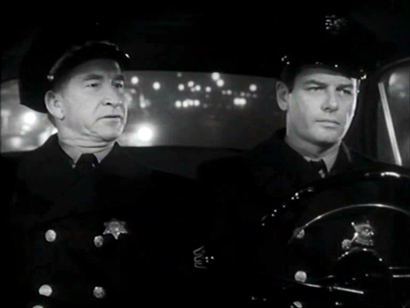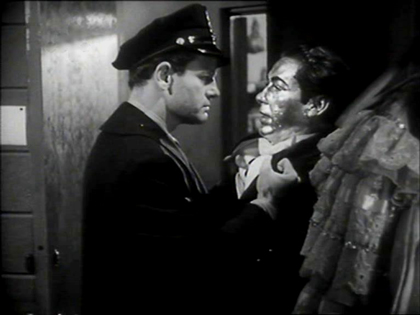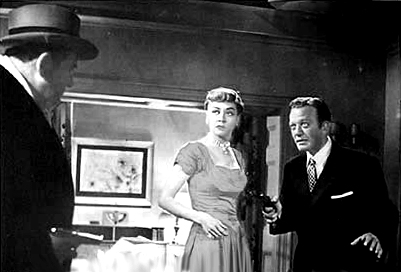
 |
|
|
|
Some films noir seem intent on thrilling us with new insights on the underworld or psychological spins on what were once simple cops and robbers stories. Others seem inspired by the need to express ideas about society not normally acknowledged in the largely wholesome, consumer-driven culture of the 1940s and '50s. But there are also shows that contain a number of noir earmarks yet have no gnawing desire to make a social statement. Sometimes just a gimmick will do. A couple of weeks back I reviewed the 1954 Republic noir Hell's Half Acre, an underworld thriller set in sunny Honolulu, of all places. One year earlier, its writer Steve Fisher and producer-director John H. Auer filmed City that Never Sleeps, largely on location in Chicago. A more traditional mix of intrigues and tangled desires centering on a policeman who considers going bad, this show can boast a great cast that includes William Talman as a charismatic bad guy and Marie Windsor in full femme fatale mode. And it makes use of a pair of very non-noir storytelling gimmicks, one that verges on fantasy and another that makes City that Never Sleeps instantly memorable: "What was that movie with the guy in the window pretending to be a mechanical man...?" 
The show begins by aping The Naked City's omniscient narrator. A disembodied "Voice of the City" tells us that another day is beginning in Chicago. But cop Johnny Kelly (Gig Young) is already in trouble. He wants to leave his wife Kathy (Paula Raymond) for Sally Connors, a nightclub stripper who goes by the name Angel Face (Mala Powers). Johnny feels he was forced to become a cop out of family tradition. His father Sgt. John Kelly, or Pop (Otto Hulett) is offering unwanted marital advice. Johnny has decided to tell Sally that he's calling off their plan to run away to California, when the crooked lawyer Penrod Biddel (Edward Arnold) wags a tempting offer in front of his face. Penrod's henchman Hayes Stewart (William Talman) is becoming 'ambitious' and refuses to follow orders; Penrod wants Johnny to quietly kidnap the ex-pickpocket and take him across the state line, where he'll be arrested on an outstanding warrant. What Penrod doesn't know is that Hayes is having an affair with his wife Lydia (Marie Windsor). They plan to rob him and run away together. Everybody seems to be working an angle that affects other people. Sally knows she's breaking up a marriage, but is desperate to make a fresh start -- she wanted to be a serious dancer and has been reduced to a sleazy nightclub act. Hayes Stewart's ambition was to become a magician -- he even keeps a rabbit for practice -- before Penrod roped him into servitude with promises of a future as a rich gentleman. John doesn't know that his younger brother Stubby (Ron Hagerthy) is serving as Hayes' helper and stooge. When John reports to his patrol car, he finds that his partner for the day is a mysterious cop named Sgt. Joe (Chill Wills), whose voice is also The Voice of Chicago. Joe seems to have materialized out of thin air in response to Johnny's disillusion. He tries to convince Johnny that his job means something. The capper is a Mechanical Man who performs in a storefront window outside Sally's nightclub, snaring the attention of passers-by that try to guess if he's real, or an actor with silver paint on his face. He's Gregg Warren (Wally Cassell of White Heat) and he's in love with Sally as well. Gregg must maintain his Mechanical Man act no matter what happens, even when he sees Johnny Kelly enter the club to romance the girl of his dreams. 
City that Never Sleeps is a gimmicky but very entertaining thriller, a realistic semi-docu noirs with amusing fantasy ambitions. With his Southern drawl, folksy Chill Wills would seem more at home in Oklahoma City than Chicago. He comes off as a heavenly figure out of a film blanc, making us think that the movie might become It's a Wonderful Cop's Life, with Sgt. Joe taking the place of the Guardian Angel Clarence: "Every time a siren wails, a rookie cop gets his stripes." The other gimmick is the Mechanical Man, who may have been inspired by William Saroyan's The Human Comedy: an important showdown at the conclusion pivots on the question of whether the mad dog killer Hayes Stewart accepts the window dummy as a robot, or realizes that he's a potential witness to murder. Like a clown that's "Crying On The Inside", Gregg Warren's trauma over losing Sally may be his undoing. In between these oddball story points Steve Fisher and John H. Auer present an interesting tangle of dangerous people on a night that will see all of them threatened and several shot dead. The nightclub with its cheap floorshow is nicely sketched, as is John Russell's night-for-night filming of downtown Chicago. The script gets away with using a messy bed to suggest that Hayes Stewart and Lydia Biddel have just had sex. Johnny and Sgt. Joe search an office building, while Hayes Stewart breaks into an office safe on the 16th floor. The theme overall is a very non-noir struggle between Good and Evil, with Sgt. Joe working on Johnny's conscience, trying to keep him from falling into the same trap that ensnared Hayes Stewart. The film also sends a strong pro-police message. A dialogue line swipes a speech from The Asphalt Jungle five years before: "Just imagine what this town would be like if there wasn't a police force?" The Production Code office forced the line on John Huston's movie about sympathetic crooks; by contrast, Republic is looking for Law 'n' Order messages. Modern sensibilities will also be ruffled by the script's glib solution for Johnny and Kathy's marriage problem. Kathy has a job (gasp!) and everybody seems to agree that it's an awful idea that she earns more money than he does. The resolution of this point will have feminists throwing things at their TV monitors. Aided by some great acting, writer Steve Fisher manages several very suspenseful guns-out confrontations. At one point, a sickening case of mistaken identity leads a policeman into a death trap. Marie Windsor and Hayes Stewart make a dynamite pair of noir losers, and we feel for them almost as much as we do the heroes. They aren't all bad, they're just written that way. 
Gig Young's crisis of conscience feels like standard material but the subplots that revolve around his moral lapse show real depth. Penrod Biddel gains our sympathy by trying to keep his wife out of trouble, even after she's tried to kill him and laughed in his face. And Gregg Warren and Sally Connors' relationship takes on the shape of a great romance, when she realizes he's taking a mortal risk just to prove to her that he's as brave as Johnny Kelly. The movie climaxes with an extended foot chase on one of the windy city's elevated train lines. It's predictable but very nicely filmed, with a crew lighting up whole blocks of buildings in the dead of night. Collapsed on the rails, one luckless victim seems to ooze through the gap between railroad ties before dropping drop three or four stories to the street below. Filmed just as classic noir was beginning to disappear, City that Never Sleeps has some awkward ideas and feels the need to reinforce the status quo, but it remains an audience pleaser. Olive Films' Blu-ray of City that Never Sleeps is a great transfer of this exciting show, one that will doubtless have a special appeal for Chicagoans interested in a peek at their town sixty years ago. The transfer quality is excellent, even with sporadic instances of dirt and white specks. We enjoy the rich blacks in the nighttime chase, and remember the odd sight of a tell-tale teardrop running down the Mechanical Man's silver-painted face. Once again the Aspect Ratio is questionable. Republic officially began composing for widescreen in May of 1953 and made their official announcement on August 8, 1953. City that Never Sleeps was released in June of 1953, but it still looks as if it should be 1.66. The titles are centered in a horizontal stripe, and every shot in the picture has a lot of 'unused' space at the bottom of the frame (note the first two frame grabs, above). Hanging a 1:66 scan from a point near the top of the frame would lose nothing of compositional importance, discarding all the unused 'protected' space below. The primitive cover art may look like it belongs on an 1895 dime novel ... but it's a Republic original. Stop being such a cheapskate, Herbert J. Yates!
On a scale of Excellent, Good, Fair, and Poor,
City that Never Sleeps Blu-ray rates:
Reviews on the Savant main site have additional credits information and are often updated and annotated with footnotes, reader input and graphics.
Review Staff | About DVD Talk | Newsletter Subscribe | Join DVD Talk Forum |
| ||||||||||||||||||